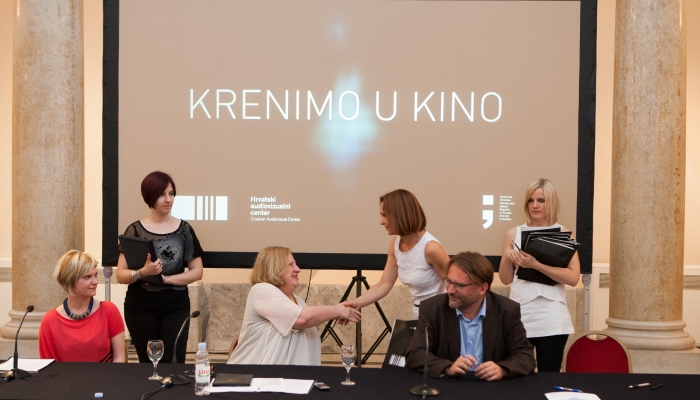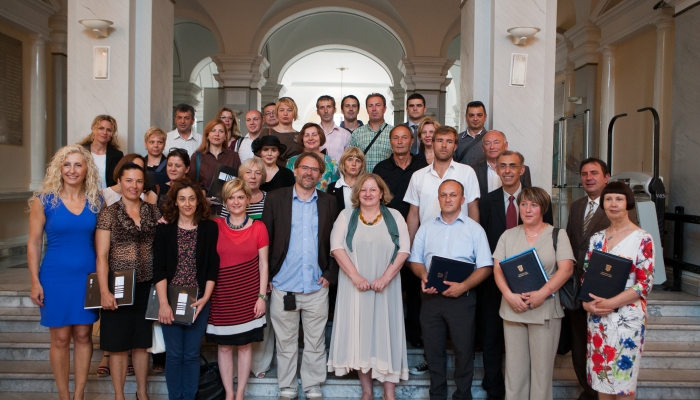Digital Equipment Contracts Signed for 29 Croatian Cinemas


Zagreb, 8 July – A media conference took place today at Zagreb’s Mimara Museum at the occasion of official signing of the contracts pertaining to the project of Independent Cinema Digitalization. The conference was attended by Minister of Culture of the Republic of Croatia Andrea Zlatar Violić, Head of the Croatian Audiovisual Centre Hrvoje Hribar, and Independent Cinema Digitalization project manager Tina Hajon, as well as around 30 representatives of city governments and cinemas from across Croatia.
Independent cinema digitalization is part of the National Programme of Audiovisual Activities 2010-2014 and a strategic project jointly launched by the Croatian Audiovisual Centre and the Ministry of Culture, with support from local governments, aiming to strengthen independent cinemas, increase the rates of European, Croatian and independent global titles in cinemas and enrich the diversity of cultural offer in towns and smaller environments.
The media conference was opened by the Minister of Culture Andrea Zlatar Violić. We are currently at the final stage of project implementation we have been working on for two years: the project of creating an independent national network of art cinemas. In the first round of digitalization we will technically equip 28 cinemas in 18 counties and 27 towns. This is a project that can have a truly emotional context aside from the technical one – we all like to see a good film, but in some places we might not even have a film theatre to enjoy. Cinemas are places of maturing and acquainting with the world on both sides of the screen. Cinemas are places of urban gathering and we want to keep that direction.
Often we hear that new technologies destroyed the cinema. This project is based on a twist – we are taking advantage of new technologies to bring people back to the theatres, and the only way to do it is to provide them with a technically good and financially affordable service and, most importantly, good programme listings.
Minister Zlatar Violić continued: A public tender for cinema equipment helped us fulfil three goals. We managed to support cities and local governments financially so that they may establish a cultural offer on the level their environment deserves. Secondly, joint procurement and unified tender helped us reduce the total cost by a third of the nominal price and save enough means for seven or eight new digital systems which will be made available in the next tender. And most importantly, we embarked on this project simultaneously and together, which proved that we are part of a unified network, a network based on the idea that everyone should have a movie theatre in their town.
This kind of project has never been implemented in Croatia thus far. These contracts were not written according to the usual template – they set new programme conditions and enable us to enter the future we have created ourselves. Therefore I wish to thank all of you for showing determination and passion for your line of work, as well as the great care and love you feel not only for the cinema, but also for all those who will become addicted to good films, said Minister Zlatar Violić in conclusion.
Head of the Croatian Audiovisual Centre Hrvoje Hribar reflected on the digitalization context within the National Plan for the Development of Audiovisual Industry. Two years ago the Croatian Audiovisual Centre promoted the National Programme for the Development of Croatian Audiovisual Industry. Do you remember our slogan? It said: Let’s repair Croatia’s image and sound! This tech cry was not literal. Quite the contrary, it was deliberately humorous. The sound and image we wanted to change were not technical, but primarily creative, financial and organisational issues. Today the slogan is most literal: We’re repairing Croatia’s image and sound!
This technical progress has a more radical side as well: with the change of technology in your theatres, a lot more than technical conditions changes. What changes? Everything: working methods, thinking, acting. Minister Andrea Zlatar and her team took full responsibility for this action and implemented it to the level it has today. The Ministry of Culture thus abandoned their usual patterns and went to the uncharted territory. The Minister and her collaborators – gentlemen Žilić, Šipuš, Jelić and others deserve appreciation. Not only for enabling technical donations, but also for setting an example to you, our dear colleagues from local communities. They were ready for change. I hope you too are ready for change. The demands of digital technology, programme demands from the Croatian Audiovisual Centre, audience’s repertory demands, there is so much to fulfil. Is the step too big, is the task too difficult? How to please technology, how to compile the repertory, how to attract the audience? How to establish a network of collaboration and coordination? When we arrange that, the work is done. I know you are ready for this, otherwise you would not be here today. And for that I warmly congratulate you. See you in the fall, at the opening of the independent Croatian cinema network, said Hrvoje Hribar in explanation.
Independent Cinema Digitalization project manager Tina Hajon placed the digitalization project in the European context. The implementation of this project makes Croatia one of the finest examples of European practice. While many countries still don’t have a developed national strategy of digitalization and support to independent cinemas, by the end of September Croatia will be 90 per cent digitalised. This project is unique in Europe because it represents a combination of technological improvement, implementation of film programme and profession development. The programme obligations of the Croatian Audiovisual Centre were inspired by the principles of the international Europa Cinemas organisation and MEDIA Programme, based on the analysis of specific data provided by the Croatian cinemas. The digitalization requires new working methods and gives new possibilities. We can be more competitive, have more diverse and richer film programmes and at the same time use European funds for the development of activities and screening European film. We will systematically work to strengthen and promote cinema activities as the most important sector of film industry. Therefore, this is not the end of this process: in autumn we continue with roundtables, discussions and education programmes on the subject of diversification, distribution and networking. I am certain that together we can do so much more, so I consider this an excellent start.
This project encompasses 28 of the total of 43 independent cinemas in Croatia. Technical equipping of their screening rooms should be completed in autumn this year.
High-resolution photographs and other press materials (a press release in a word document, a list of independent cinemas and representatives of cities and towns who attended the conference, and a map of digitalised cinemas) can be found on this link.
Photographs by: Alan Vajdić
Cover photos: Tina Hajon, Andrea Zlatar Violić and Hrvoje Hribar; Tina Hajon, Hrvoje Hribar, Andrea Zlatar Violić and representatives of independent theatres
